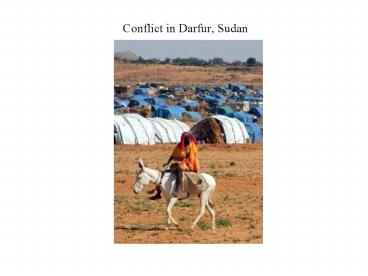Conflict in Darfur, Sudan - PowerPoint PPT Presentation
1 / 16
Title:
Conflict in Darfur, Sudan
Description:
Janjaweet are a militia group hired by Sudanese government to wipe out civilian rebels. ... Refuge camps in western Sudan and neighboring Chad are overflowing ... – PowerPoint PPT presentation
Number of Views:618
Avg rating:5.0/5.0
Title: Conflict in Darfur, Sudan
1
Conflict in Darfur, Sudan
2
western Sudan, Darfur region
3
- Present Situation
- Darfur Region of western Sudan half population
is displaced, half the villages are destroyed. - Janjaweet are a militia group hired by Sudanese
government to wipe out civilian rebels. - 2 million people displaced (highest internal
displacement in the world) - Tens of thousands dead from murder and starvation
(2 million in need of food) - Refuge camps in western Sudan and neighboring
Chad are overflowing - US Secretary of State Colin Powell has called it
genocide
4
A Complicated History Environmental factors Dese
rtification is disrupting land tenure patterns of
the pastoralists and farmers in this region.
Socio-economic factors certain groups are suffe
ring from this desertification
Political factors conflicts are emerging from f
eelings of marginalization (being pushed to the
outside of society) Government Over the last 4
0 years Islamist organization grew and penetrated
the state. In 1989 they engineered a coup and
introduced their vision of an Islamic state.
5
Beginning in Spring of 2003
3 different African groups in Sudan formed 2 reb
el groups. Government employed Janjaweet militi
a to wipe out the rebels, with freedom to use any
means. Janjaweet are Arabs holding racist ideol
ogy. They believe Arabs are rightful owners of
land in Darfur and the African people should be
driven out. Their tactics murder, rape, burnin
g villages, stealing cattle and camels, poisoning
water supply
6
Our Family This is a series from the BBC on
peoples daily lives. Kaltoom Hamid Aseel (left)
tells of her life in Kalma refugee camp in Darfur
in western Sudan. I am 27. My three children are
sick with diarrhoea. We live in one hut with my
sisters, Neimad (right), and Mona.
Neimad has two children. There are eight of us.
My husband is dead. Neimads husband was taken
away. We have not seen him in months.
7
We used to live well before we came to this
place. Our village was Mukja. We had to leave on
25 April when the Janjaweed (pro-government
militias) attacked us. The village had 7,000 g
oats, 1,000 donkeys, 2,000 camels and 3,000
horses and many thousands of chickens.
They took the men away, and then we heard shots.
The women stayed. The Janjaweed said "Why do you
stay? We killed your men." Later I went to where
the shots came from and found my husbands body.
8
This is my son Mossab, six, (left) and Neimads
son Modessel, four. A small cut on Modessels
right ankle grows larger all the time.
There is very little for the children to do at t
he camp.
9
The water is filled with waste run-off and is
unfit for swimming, let alone drinking.
However, the heat and boredom of camp life mean
the children cannot be stopped from diving into
the pools of muck and water brought by the
Saharas seasonal rains.
10
We fetch water several times each day.
I will use it to make porridge. All we eat i
s porridge.
11
Females are the heads of most households in the
Darfur camps. Most of the men are in hiding or
were killed. Here, a group of men from the Kalma
Camp set off for the town of Nyala in search of
part-time farm work.
12
The familys hut provided by the camp. The women
decide to build another hut for the family.
13
Neimad takes her six-month-old daughter,
Mozzemel, to a Kalma health clinic to treat the
childs diarrhoea. She is given a packet of or
al rehydration salts because the child has become
severely dehydrated.
14
Neimad has been working to complete the hut while
I nurse my daughter, Ietmad. We are happy that w
e will be living next to the new clinic.
(The clinic, recently built by the International
Rescue Committee, opened on 30 August).
15
Its time to collect the groceries. Families from
Kalma Camp line up for food delivered by relief
agencies. Despite the relief, there is a large
measure of shame among a people who once were
completely self-sufficient. Photos Mark Fritz,
International Rescue Committee
16
Benefits and Consequences for Sudanese
Government Governments use of Janjaweet has be
en successful in eroding rebels ability to
conduct military attacks by destroying their
civilian support. However, the plan has also
backfired because so many young people have lost
family members that they are now dedicated to
fighting the government and the Janjaweet. Young
children are becoming rebels. U.N. Security Cou
ncil has been unsuccessful in getting Sudanese
government to stop the attacks. The situation
has been called the worst genocide since Rwanda
in 1994 but little has been done.































